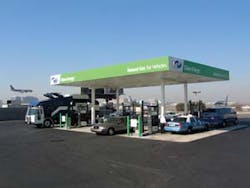Clean Energy touts itself as “North America’s leader in clean transportation”. It is targeting airports which the company says can benefit by reducing vehicle operational costs while also cutting emissions. The Seal Beach, CA-based firm offers to work with airports on a speculative basis to determine the economics of installing a compressed natural gas (CNG) station either on-airport or adjacent to airport property, for use in vehicles both inside and outside the fence. In addition, airports have an opportunity to generate revenues by charging flowage fees.
Explains Dan Huberty, vice president of Clean Energy’s Airport Sector, “An airport really doesn’t have much of an opportunity to clean up their air quality because of the jet fuel that’s being used. So the only opportunitiy to really make an impact on air quality is through the ground transportation operations. A lot of airports are looking at their internal fleet and looking at natural gas.”
Clean Energy is currently located at 23 airports in the U.S., with another nine under development, according to Huberty. If a CNG station is to be installed, Clean Energy makes the investment, which generally runs some $1 million. Huberty says that sum can be as high as $3 million if a consolidated rental car facility is part of the plan. It only takes 30 to 40 vehicles on an airport to justify the investment, says Huberty.
If the market is large enough, such as around Newark Liberty International, Clean Energy may make the investment even without airport buy-in, though Huberty says having a station nearby can serve as a stimulus.
“We look at it from the perspective that asks, Is the airport interested in converting its fleet?” he explains. “If yes, that makes a big difference. How big is the fleet? We look at the size of the taxi market. And we also look at whether or not the airport is willing to adopt policy. Policy is very important; an airport can develop policies that help their air quality by requiring a percentage of the fleet to be an alternative fuel, whether it’s natural gas or hybrids or whatever. Then it’s our job to convince the operators that they should buy natural gas vehicles versus some other form of vehicle.”
If the site is on-airport, Clean Energy enters a lease agreement and generally requires about three-quarters of an acre for the station’s footprint. Besides generating revenues from the lease, an airport can also charge a flowage fee to users.
And, Huberty points out that CNG is significantly less costly than diesel or auto gas. “It’s not just about air quality; it’s also about the economics,” he says.





